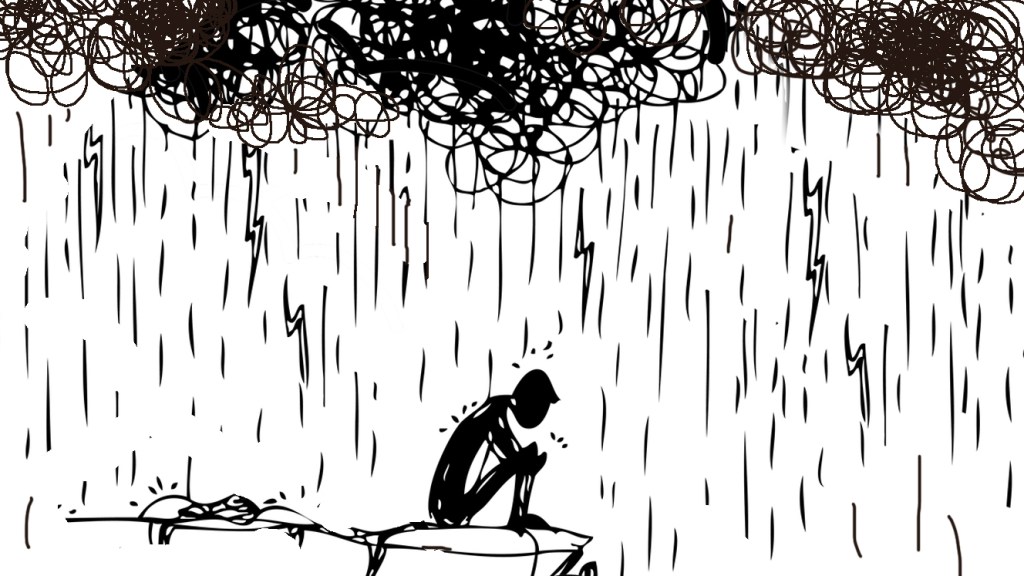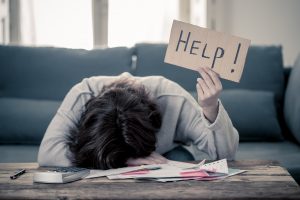Anxiety: Anxiety is a normal stress reaction and can be beneficial in some situations. Anxiety which may be related to fear and/or worry can happen to any person and is dependent upon time and situation as well. It is not unusual for a person to experience anxiety before any event or making any vital decision. However, chronic anxiety may be extremely debilitating as it can result in the development of irrational fears or thinking processes that may significantly impair a person’s life.
Depression: Depression is among the most common and costly of all psychiatric disorders. It is associated with a constant feeling of emotional down-side, sadness, or an upset mood. This feeling may continue for days, weeks, or even months.
How Are Depression and Anxiety Diagnosed?
Anxiety can be diagnosed by identifying many features like
-
Early fatigue
-
Difficulty in mental concentrating and/or re-calling any event Muscular strain
-
Heart palpitations
-
Bruxism or grinding or clenching of teeth
-
Difficulty in sleeping such as difficulty to fall asleep as well as restlessness, feeling tired even after sleeping
-
Constant feeling of restlessness, irritability, or continuous feeling as if on the emotional edge
-
Difficulty in controlling the feeling of fear and worry; Constant feeling of dread and a continuous feeling of panic and dread
Symptoms of depression may include various symptoms and changes related to behavior such as
-
A decrease in energy levels, feeling of chronic fatigues or sluggishness
-
Inability to concentrate, make decisions or partial loss of memory
-
Body pain, backache, muscle cramps, or gastrointestinal disturbances
-
Increase or decrease in appetite or sudden change in weight
-
Difficulty in falling asleep, inability to wake up early, or tendency to oversleep
-
Lack of interest in routine activities and pleasurable hobbies
-
Constantly feeling sad and/or anxious
-
Loss of hope or development of pessimism
-
The feeling of anger and irritability
-
Constant feeling of guilt or loss of self-worth and Suicidal feelings or attempts
There is no single investigation or test which can help in a pinpoint or getting diagnosed with depression and anxiety. The consultant doctor conducts a physical examination along with a screening test for anxiety and depression. In the screening examination, the doctor will ask various questions which helps in getting insight into a person’s problem. If the test results are unclear or if a suspicion arises that the presenting symptoms are the result of any other disease condition, further tests may be carried out such as blood investigations, CT scans, and MRI.
What’s the connection between anxiety and depression?

Depression and anxiety may occur at the same time. It has been estimated that 45 percent of individuals with any mental health disorder may meet the criteria for both disorders. Most of the symptoms related to depression as well as anxiety overlap with each other, for example, difficulty sleeping, irritation, panic, feeling of fear, loss of interest, and inability to concentrate.
Points that Can Trigger Anxiety and Depression
There may be various stressors that can cause the triggering of anxiety and depression in subjects, for example, loss of a relative, bereavement, financial loss, prolonged illness of either self or any relative, and loss of job.
How Therapy Can Help Anxiety and Depression?

After the diagnosis of anxiety and depression, a physician refers the patient to a mental health specialist or psychiatrist, or a psychologist who decides upon the type of treatment that may be given to a patient. Each of the therapy types has distinct features which may be suitable for some people and unsuitable for others. Thus, the choice of therapy may be recommended which are of following types–
-
Cognitive-behavioral therapy: After using this therapy, a person learns to adjust their thought process, behavioral patterns, and responses in a normal manner.
-
Interpersonal therapy. This type of therapy is mainly aimed towards learning various strategies for communication which help the inability to better self-expression.
-
Problem-solving therapy. This type of therapy works on enhancing one’s coping skills for managing symptoms.
Therapy for Anxiety and Depression
Very frequently, depression and anxiety may be treated similarly. In most cases, therapy is tailored as per an individual’s requirements. This effectively causes a reduction in symptoms.
-
Agents used: There are various types of medications that may be used to cure for anxiety and depression as both of these conditions overlap each other. Medicaments or drugs that are prescribed are-
-
Antidepressants: There are various classes of this category of drugs which include- a) serotonin re-uptake inhibitors and b) serotonin-norepinephrine reuptake inhibitors. The type of medication prescribed largely depends on the severity of clinical symptoms.
-
Anti-anxiety drugs: These drugs help in reducing symptoms related to anxiety. However, they may not help in dealing with symptoms of depression. However, these agents carry the risk of developing addictive behavior, hence, they are used only for a short period.
-
Mood stabilizers. These psychotropic drugs are used for stabilizing emotional changes or moods when prescribed antidepressants do not work fully.
-
Alternative therapy: There are other modes of therapy available that do not use any drugs. Although not widely used for treating mental health issues, hypnotherapy causes a reduction in clinical signs and symptoms. It has shown wide effects such as the ability for better concentration and focus, better control over emotions, and good management of emotions and self-conscious behavior.
-
Exercising: It is a proven mood enhancer as well as a booster that is good for physical as well as mental and emotional health. Regular exercising causes an increase in self-esteem as well as the level of confidence and can positively impact interpersonal relationships. Also, it is considered as a treatment for curing mild and moderate depression. Exercising boosts endorphin levels, a feel-good hormone in the brain. For this purpose, a high-impact and frequent form of exercise is considered the best option. A person should exercise at least 3 to 5 times per week.
-
Relaxation methods: Practice yoga, meditation, and breathing exercises.
-
Diet check: Comfort foods should be avoided since anxiety and depression may trigger severe cravings for carbohydrates and ice cream. Alcohol should be avoided.
-
Get family and friend support or join a support group composed of individuals who recovered from these mental health issues.
When to See a Doctor?

If there are persistent symptoms that may last for up to two or more weeks are indicative of existing mental health issues such as depression, anxiety, or both. These symptoms usually include- i) Problems related to sleep or changes in sleep patterns; ii) Sudden changes in emotions; iii) Sudden lack of interest in routine activities or hobbies and iv) Feeling of loss of worth or helplessness.
If a person loses emotional control and starts feeling down, especially after a traumatic episode that may be an inciting trigger, it is always better to book an appointment with a specialist. Most importantly, a person should be open and honestly provide detailed history so that a doctor can completely understand the clinical problem and can achieve a clearer diagnosis and subsequently, further tests and treatment can be planned.
Who Can Help You?
The first and most important step before getting a diagnosis is to plan a visit to a doctor or physician for medical examination. Few medications are administered to medically manage the symptoms. However, there are some systemic or medical problems most importantly, a thyroid-related disorder that may result in symptoms related to anxiety and depression. A doctor shall conduct a physical examination, conduct a detailed interview, and various laboratory tests to eliminate any medical cause, for implementation of any treatment, or for referring the patient to any certified mental health practitioner. Following diagnosis, the affected individual is treated by any method whichever is applicable.
How Centric Healthcare Can Help?
By providing access to mental health therapists daily along with:
-
access to health care around the clock
-
vigorously trained healthcare givers
-
unique and tailor-made mental and physical care as per individual
-
avoidance of long-term contracts
-
superior reviews
-
trusted partnership
-
availability of therapeutic methods for various conditions under one roof.
Home Health care services
Home Health Services function by evaluating a person’s response to certain medications and providing interventions, if side-effects of those medications are causing additional mental health issues, chronic mental problems can lead to feelings of low self-worth and depression and may require a therapist to learn to cope up with these feelings. Mental health Therapists not only provide instructions related to mental health issues but also, instruct a patient’s caregiver(s) regarding expectations from therapy and how they can help with treatment.

